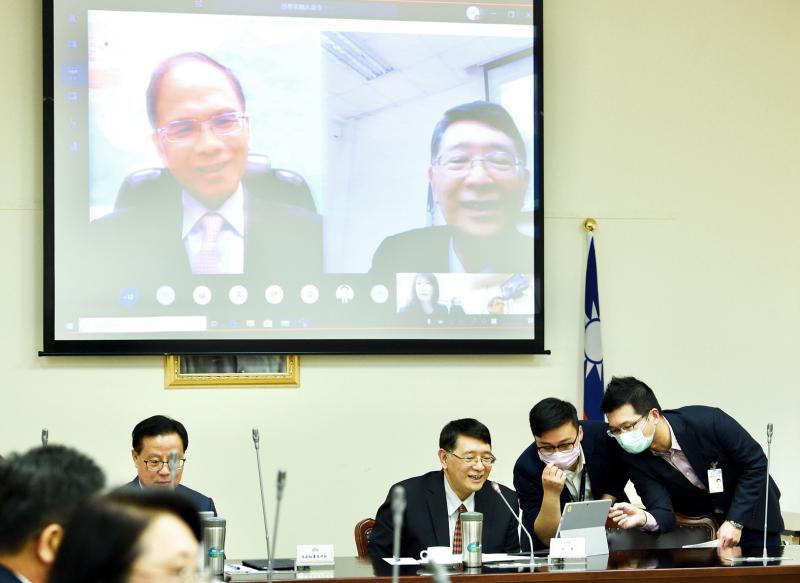The Legislative Yuan’s ability to hold sessions remotely — if the COVID-19 outbreak worsens — was tested yesterday as Legislative Speaker You Si-kun (游錫堃) and Secretary-General Lin Chih-chia (林志嘉) held a teleconference.
While there was some delay in transmission, the video quality was clear, Lin said.
Lin watched as the conference was arranged in a meeting room and then returned to his office to be patched in after You accepted the call in his office.

Photo: Peter Lo, Taipei Times
During the call, You told Lin that planning was necessary to ensure that legislative affairs — the review of bills and budgets — can continue during the outbreak.
No one wishes for the situation to get worse, but one must be prepared, he said, adding that it was possible that Taiwan’s legislature is the first to take such measures.
Lin said that the legislature would also conduct drills on how to vote on motions via teleconference.
The system would be tested for various situations, beginning with a legislative affairs meeting, followed by a Procedure Committee meeting, a standing committee meeting and ultimately, a full floor session, he said.
“We hope not to have to use the system, but we must make what preparations we can,” Lin said.
The system would only be used if the legislative speaker decided — after convening an emergency session of the legislature after two legislators have been tested positive for COVID-19 — to suspend legislative meetings entirely or to conduct some meetings via teleconference, Lin said.
The next two weeks would be critical for the nation’s disease prevention efforts, Lin said, citing Minister of Health and Welfare Chen Shih-chung (陳時中), and he urged public solidarity.
Taiwan’s ban on foreigners entering the country, effective today, borders on a lockdown of the nation, he said.
Lin also thanked Microsoft for providing the teleconferencing system and hardware, and for helping testing the system yesterday.

The manufacture of the remaining 28 M1A2T Abrams tanks Taiwan purchased from the US has recently been completed, and they are expected to be delivered within the next one to two months, a source said yesterday. The Ministry of National Defense is arranging cargo ships to transport the tanks to Taiwan as soon as possible, said the source, who is familiar with the matter. The estimated arrival time ranges from late this month to early next month, the source said. The 28 Abrams tanks make up the third and final batch of a total of 108 tanks, valued at about NT$40.5 billion

Two Taiwanese prosecutors were questioned by Chinese security personnel at their hotel during a trip to China’s Henan Province this month, the Mainland Affairs Council (MAC) said yesterday. The officers had personal information on the prosecutors, including “when they were assigned to their posts, their work locations and job titles,” MAC Deputy Minister and spokesman Liang Wen-chieh (梁文傑) said. On top of asking about their agencies and positions, the officers also questioned the prosecutors about the Cross-Strait Joint Crime-Fighting and Judicial Mutual Assistance Agreement, a pact that serves as the framework for Taiwan-China cooperation on combating crime and providing judicial assistance, Liang

A group from the Taiwanese Designers in Australia association yesterday represented Taiwan at the Midsumma Pride March in Melbourne. The march, held in the St. Kilda suburb, is the city’s largest LGBTQIA+ parade and the flagship event of the annual Midsumma Festival. It attracted more than 45,000 spectators who supported the 400 groups and 10,000 marchers that participated this year, the association said. Taiwanese Designers said they organized a team to march for Taiwan this year, joining politicians, government agencies, professionals and community organizations in showing support for LGBTQIA+ people and diverse communities. As the first country in Asia to legalize same-sex

MOTIVES QUESTIONED The PLA considers Xi’s policies toward Taiwan to be driven by personal considerations rather than military assessment, the Epoch Times reports Chinese President Xi Jinping’s (習近平) latest purge of the Chinese People’s Liberation Army (PLA) leadership might have been prompted by the military’s opposition to plans of invading Taiwan, the Epoch Times said. The Chinese military opposes waging war against Taiwan by a large consensus, putting it at odds with Xi’s vision, the Falun Gong-affiliated daily said in a report on Thursday, citing anonymous sources with insight into the PLA’s inner workings. The opposition is not the opinion of a few generals, but a widely shared view among the PLA cadre, the Epoch Times cited them as saying. “Chinese forces know full well that